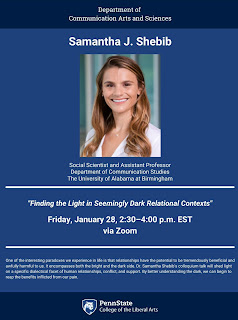Finding the Light in Seemingly Dark Relational Contexts
Recently, I had the privilege and honor to be the colloquium speaker at Penn State, where I gave a research talk titled "Finding the Light in Seemingly Dark Relational Contexts." One of the interesting paradoxes we experience in life is that relationships have the potential to be tremendously beneficial and awfully harmful to us. It encompasses both the bright and the dark side. My colloquium talk shed light on a specific dialectical facet of human relationships, conflict and support. By better understanding the dark, we can begin to reap the benefits inflicted from our pain.
Throughout my work on supportive situations, I began increasingly interested in how support can lead to conflict. We can all think of times when we got too much support (or undesired support, like helicopter parenting), received worse support than expected, or how a lack of support from a loved one turns into a conflict episode. Additionally, the remedy to conflict is supportive and constructive communication. Thus, darkness and light (conflict and support) are not totally discrete opposites, but rather light can become intertwined with darkness.
Past positive and negative aspects of relationships have been studied as a dichotomous phenomenon with the negative sides being understood as mistakes—deviations from positive—and aren’t fundamental parts of relationships.
Seeing dark and light as a dichotomy is misleading; instead, dark aspects of relating should be considered as elements in the totality of the relational experience.
Dark clouds have silver linings and silver clouds have dark linings, too.
-Dr. Samantha J. Shebib (March 4th, 2022)



Comments
Post a Comment